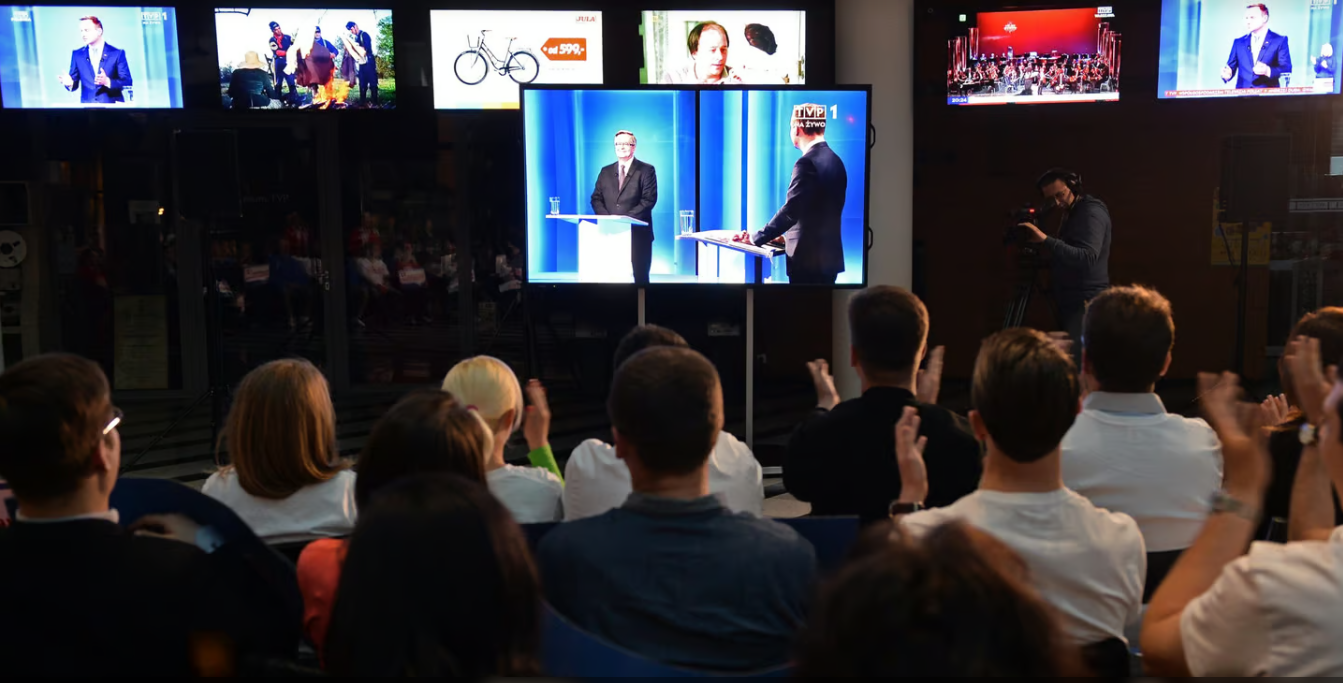Is Poland’s Election Fair? Pro-Government Media Bias Casts a Shadow over Vote

By Nicolas Camut, Politico | 15 September 2023
The Polish government’s control of the public broadcaster, as well as the media regulator and its use of public funds to influence media organizations, is distorting the political landscape ahead of the October 15 general election, NGOs and media watchdogs warned Friday.
Poland’s media freedom has declined precipitously since the ruling nationalist Law and Justice (PiS) party took power in 2015.
The main channel of government influence is its control of the Polish public broadcaster, Telewizja Polska (TVP), which has turned into the propaganda arm of the ruling party with no effort to provide balanced coverage. TVP controls about a third of the Polish broadcast market, and is especially dominant in the smaller towns and countryside that are crucial to the electoral fortunes of PiS.
“TVP is failing in the fundamental duty of any public broadcaster to provide fair and balanced political coverage between and during elections,” Media Freedom Rapid Response, an umbrella group of European press freedom organizations, said in a statement.
TVP did not respond to a request for comment.
It’s not the only such concern about media freedom in Poland.
Poland came in 57th out of 180 countries in the annual press freedom index complied by Reporters Without Borders, an NGO; that’s one of the lowest rankings in the EU. It was 18th in 2015.
“After turning the public media into instruments of propaganda, the government has multiplied its attempts to change the editorial line of private media and control information on sensitive subjects,” the NGO noted.
Friday’s Media Freedom Rapid Response release highlighted TVP’s skewed coverage.
“According to monitoring figures provided by the Polish National Broadcasting Council (KRRiT) for the second quarter of 2023, the governing coalition dominates TVP news, enjoying 80 percent of political coverage, of which 73 percent is dedicated to PiS,” the media freedom groups said. The remaining coverage is split among opposition parties and is “overwhelmingly negative.”
Asked for a reaction, a spokesperson for TVP said: “TVP, following the principle of pluralism, invites guests with different views, from all sides of the political scene, to its programs.”
It’s not just the public broadcaster that’s helping PiS.
KRRiT, whose composition is controlled by PiS allies, has used its licensing powers to intimidate independent broadcasters, and has also issued financial penalties against media organizations reporting on issues that are uncomfortable for the government.
“Polish media are additionally subjected to one of the largest number of vexatious lawsuits, or SLAPPs, in the European Union,” the press release said.
The regulator did not immediately respond to a request for comment.
Cash for coverage
The government is also using the advertising budgets of ministries as well as state-controlled companies to punish and reward news organizations.
“Many private media are denied access to state advertising funds which PiS has weaponized to fund favorable media outlets and undermine independent journalism,” the NGOs said.
The government-controlled refiner PKN-Orlen has also become a big media player, buying the Polska Press chain of local newspapers and web sites in 2021. Although Orlen said this was a purely business decision and that it would not interfere in press freedom, it quickly purged editors and many reporters.
“The purchase has further restricted access to diverse media, particularly in rural areas with limited internet access,” the NGOs noted.
Media control pays political dividends for the ruling party. In one ongoing example, a cash-for-visas scheme that is turning into a major scandal for the government is largely ignored by TVP.
In 2020, PiS-backed President Andrzej Duda won a very narrow victory over opposition candidate Rafał Trzaskowski, in a campaign where the public media was a full-throated supporter of Duda.
“The biased coverage by the public broadcaster, remained a serious concern,” noted a post-election report by the Organization for Security and Co-operation in Europe.
There are similar worries this time around as PiS tries to win an unprecedented third term in office.
POLITICO’s Poll of Polls puts PiS at 38 percent support, while Civic Coalition, led by former Prime Minister Donald Tusk, stands at 30 percent. If that result holds, neither party will be able to govern alone, forcing a post-election scramble to cobble together a parliamentary majority with smaller parties.
If PiS hangs on to power after October 15, “four more years of the current policy would accelerate media capture and push Poland down the path to emulating the situations in Hungary, Turkey or Russia,” the NGOs added.
The groups will issue a full report in the first week of October.

